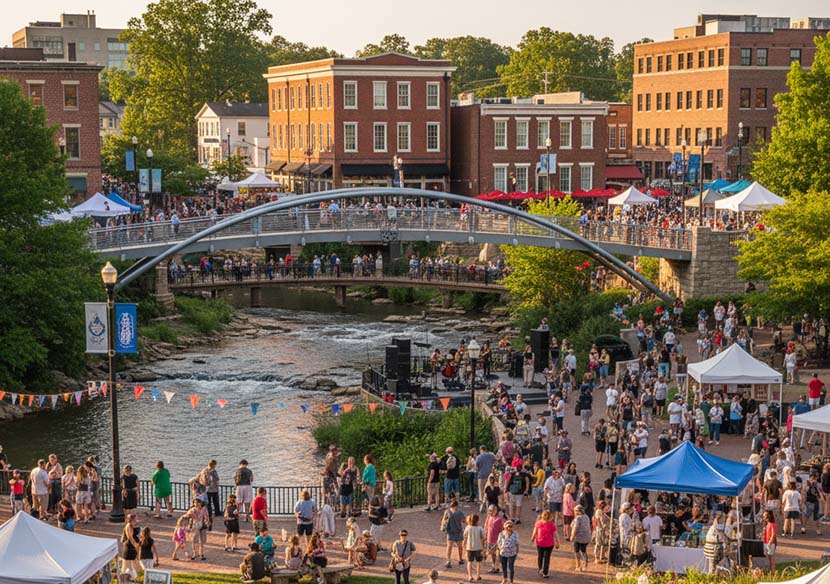Greenville Joins Redmond, Kirkland, Jackson Hole, Williamsburg, Livermore in Organizing Cultural Events to Promote Tourism, New Update is Here

Greenville has joined the ranks of cities like Redmond, Kirkland, Jackson Hole, Williamsburg, and Livermore in organizing cultural events aimed at promoting tourism. As the tourism industry continues to grow, cities are increasingly recognising the power of cultural events to drive local economies and attract visitors.
Greenville’s decision to focus on cultural events aligns with a broader trend across US cities that understand the importance of tourism in fostering economic growth. Just like Redmond, Kirkland, Jackson Hole, Williamsburg, and Livermore, Greenville is looking to leverage cultural events as a catalyst to showcase its unique identity and engage visitors from across the region and beyond.
This exciting new initiative is part of Greenville’s ongoing effort to promote its cultural heritage and vibrant local scene while boosting tourism in the area. By joining other progressive cities that are investing in tourism through cultural events, Greenville is set to elevate its status as a must-visit destination. The city’s tourism council’s involvement in approving event funding is expected to generate significant economic benefits, much like what has been seen in Redmond, Kirkland, Jackson Hole, Williamsburg, and Livermore, where tourism-driven events have led to increased visitors and spending.
As Greenville embraces this new path, the tourism industry within the city is poised for growth, reinforcing its commitment to sustainable tourism development. Stay tuned as we dive deeper into how Greenville’s cultural initiatives compare to those of other leading US cities and explore the incredible impact these events are having on their local economies.
In the rapidly growing US tourism industry, cities across the country are using tourism councils to approve event funding that drives local economies. By supporting events that attract visitors, from music festivals to art exhibitions, tourism councils are revitalizing their cities and setting new standards for economic growth. Through grants and funding, US cities are helping boost the travel industry, supporting local businesses, and elevating the tourism experience. This article takes a citywise look at how various US cities are using tourism council funding to propel their tourism sectors and attract visitors from across the globe.
Redmond, Washington: Tourism Grants for Cultural and Sporting Events
In Redmond, Washington, tourism is a key driver of local growth, and the city’s tourism grants play a significant role in supporting events that bring visitors from outside the region. The tourism council allocates grants that cover up to 50% of the event costs, which helps promote festivals, sporting events, and cultural showcases. The 2026 Tourism Grant applications closed in August, with a focus on attracting events that promote overnight stays in the city. These grants are a part of Redmond’s ongoing effort to highlight its rich cultural landscape and natural beauty while strengthening the local tourism economy. By supporting these initiatives, Redmond ensures its tourism industry thrives year-round.
Kirkland, Washington: Longstanding Support for Major Tourism Events
Kirkland, Washington, has been investing in its tourism sector for over 20 years. Through its Tourism Program, the city supports events that attract visitors and contribute to the local economy. Since 2002, the Kirkland Tourism Program has provided over $1.2 million in grants for various tourism events, including arts festivals and community celebrations. The program ensures that events align with the city’s values, offering grants of up to $60,000 annually. These initiatives play a significant role in Kirkland’s success as a vibrant and attractive destination, which continues to draw tourists, artists, and creatives to the region.
Jackson Hole, Wyoming: Supporting Off-Peak Seasonal Tourism
Jackson Hole, Wyoming, has a unique approach to event funding, especially for off-peak seasons. The Jackson Hole Travel and Tourism Board allocates funding to seasonal events happening in fall, winter, and spring. This initiative aims to ensure that the local tourism economy remains strong throughout the year, avoiding the typical seasonal fluctuations. In 2025, the board allocated $1.8 million to support events that promote tourism during the quieter months, when visitors are fewer. These funds are sourced from lodging taxes, highlighting the importance of sustainable tourism. By encouraging tourism during off-peak times, Jackson Hole ensures its tourism industry remains stable and profitable throughout the year.
Williamsburg, Virginia: Enhancing Tourism with the Tourism Development Fund
In Williamsburg, Virginia, the Tourism Development Fund (TDF) plays a key role in supporting local events that attract visitors. The fund, established in 2017, is designed to enhance tourism infrastructure, promote events, and support public-private partnerships. The TDF provides financial assistance to events that bring visitors to Williamsburg, helping to increase hotel bookings, restaurant sales, and overall local spending. The fund has been pivotal in boosting Williamsburg’s profile as a destination rich in history and culture. By investing in local events, the city continues to grow its tourism industry, ensuring that it remains a key player in Virginia’s tourism landscape.
Hamilton County, Ohio: Granting Support for Large-Scale Events
Hamilton County, Ohio, offers one of the most substantial tourism grants in the US through its Large Tourism Event Grant. This grant is specifically aimed at large-scale events with a minimum economic impact of $40 million. These events include major festivals, sporting competitions, and conferences that attract a large number of visitors. By funding such events, Hamilton County helps boost tourism and increase local revenue. The grant is designed to support one-time events, scheduled for 2025, that promise to make a significant impact on the region’s tourism industry. Hamilton County’s strategic investment in these large-scale events ensures that its tourism industry continues to grow, creating jobs and stimulating the local economy.
Newport Beach, California: Funding Signature and Community Events
Newport Beach, California, takes a comprehensive approach to tourism event funding by offering grants for both community and signature events. Signature Event Support Applications are accepted annually, with grants ranging from $10,000 to $150,000. These grants are intended to support events that have a significant impact on the city’s tourism economy. Signature events like cultural festivals and art exhibitions help promote Newport Beach’s unique identity while attracting visitors. The city’s tourism council prioritises events that align with its sustainability goals, ensuring that they not only support the local economy but also enhance the city’s environmental profile. Newport Beach’s event funding is an integral part of its strategy to boost tourism and promote a thriving local community.
Livermore, California: Grants for Tourism Promotion and Special Events
In Livermore, California, tourism grants are offered to support events that promote the city and attract visitors. The city’s Tourism and Special Event Grants are designed to help boost Livermore’s visibility and attract tourists through unique events and initiatives. These grants support a wide range of activities, including wine festivals, outdoor events, and cultural showcases. By investing in such events, the city aims to enhance its reputation as a desirable tourism destination, drawing in visitors from across the state and beyond. Livermore’s tourism grants ensure that the city remains competitive within California’s bustling tourism market.
Surprise, Arizona: Investing in Tourism Projects
Surprise, Arizona, provides funding for tourism projects, supporting events that promote tourism and contribute to the local economy. The city’s tourism grants cover up to 50% of total event costs, helping to make events more accessible and financially viable. These grants encourage a wide range of tourism activities, from arts festivals to sporting events. By investing in tourism projects, Surprise helps to boost its local economy while ensuring that it remains an attractive destination for visitors. The city’s focus on tourism funding allows it to compete with other Arizona cities and create a lasting impact on the region’s tourism industry.
Bellingham, Washington: Supporting Tourism Projects with Grants
Bellingham, Washington, offers both Standard and Start-Up grants for tourism projects that bring visitors to the city. The Standard grants typically range from $5,000 to $30,000, while Start-Up grants are capped at $5,000. These grants help fund a variety of tourism-related activities, including special events, tourism promotion, and infrastructure development. By investing in tourism projects, Bellingham helps support local businesses and increase its appeal as a tourism destination. The city’s tourism grant program ensures that it remains a key player in Washington’s competitive tourism market.
Sequim, Washington: Boosting Tourism with the Tourism Enhancement Grant Fund
Sequim, Washington, offers the Tourism Enhancement Grant Fund to support events that attract overnight guests. Grants typically range from $1,000 to $5,000, and are allocated quarterly to tourism projects that help promote the city. Priority is given to projects that attract visitors from outside the region and generate hotel stays. By funding such events, Sequim is enhancing its tourism infrastructure and ensuring that it remains an attractive destination for visitors. The Tourism Enhancement Grant Fund is an essential tool for the city to continue its growth in the tourism industry.
Montana: Supporting Destination Events
Montana’s Destination Event Grant Program helps fund events that highlight the state’s natural beauty and attract visitors from outside the region. These destination events promote Montana’s unique attributes, such as its outdoor recreation opportunities, rich history, and vibrant arts scene. By supporting these events, Montana is positioning itself as a top destination for tourists. The grant program helps local communities boost their tourism industries, creating jobs and driving economic growth. Montana’s focus on destination events ensures that it remains a leading player in the US tourism industry.
The tourism councils in US cities are instrumental in supporting the growth of the US tourism industry. By approving funding for events, these councils are ensuring that cities continue to attract visitors and stimulate local economies. From large-scale grants in Hamilton County to the seasonal event support in Jackson Hole, each city’s approach to tourism event funding plays a significant role in its economic development. As cities continue to invest in their tourism industries, the US will remain a top destination for global travelers.
Greenville University recently received approval for funding from the Greenville Tourism Committee to help promote its key events, including family weekend and homecoming. The university’s funding request for $3,162 was reduced to $3,000, the exact amount available in the tourism budget. This funding will help drive alumni visits, benefiting local motels and businesses. The committee members recognised the positive impact these events have on the local economy, specifically in terms of guest accommodation and local spending.
Greenville University’s Family Weekend and Homecoming Events
The Greenville University family weekend and homecoming activities held this past weekend were a big success. These events are important because they bring back alumni and their families to the city, where they stay in local motels and contribute to the local economy. The university’s request for funding was geared towards boosting the promotion of these events. The tourism committee’s decision to approve $3,000 was a clear recognition of the economic impact that these gatherings have on Greenville’s businesses. Alumni and their families flock to the city, enriching local businesses and helping to sustain the region’s tourism economy.
Tourism Committee’s Role in Supporting Local Growth
The tourism committee plays a crucial role in supporting local events like those at Greenville University. By providing financial assistance for promoting these events, the committee helps stimulate tourism and encourages alumni to return. The funds granted to the university were directed towards marketing efforts to raise awareness of the upcoming events. The tourism committee’s focus on tourism-driven economic growth highlights the importance of such activities for the broader Greenville area. The funding aligns with the committee’s aim to enhance the town’s reputation and attract more visitors, benefiting local businesses in the process.
Economic Impact of Greenville University Events
The funding granted to Greenville University will directly impact the local economy by encouraging tourism. When alumni visit the city, they spend money at local motels, restaurants, and shops, boosting the area’s financial well-being. The economic benefits are not limited to the weekend of the events, as such occasions often result in repeat visits. Local motels, in particular, see a significant uptick in bookings during family weekends and homecoming events. The tourism committee’s support of the university’s events reflects a shared goal to help the city thrive and become an attractive destination for alumni and visitors.
Key Factors Influencing the Tourism Committee’s Decision
The tourism committee’s decision to approve the funding was based on several key factors. First, the committee recognised that family weekend and homecoming events are essential to drawing visitors to the city. These activities create a sense of community and bring people back to their alma mater. Additionally, the committee noted that such events bring substantial financial contributions to the local economy, particularly in accommodation spending. The committee members also considered that these events are not just one-time occurrences but become part of the city’s tourism calendar, encouraging future attendance and spending.
Conclusion: The Importance of Tourism Funding for Greenville
In conclusion, the tourism committee’s decision to allocate funds for Greenville University’s family weekend and homecoming activities underscores the importance of supporting events that drive tourism and economic growth. By approving the funding request, the committee helped promote an event that not only strengthens alumni ties but also contributes to the financial health of the community. As Greenville continues to foster tourism-driven growth, it is clear that partnerships between educational institutions and local tourism committees will play a pivotal role in enhancing the city’s appeal and boosting its local economy.






